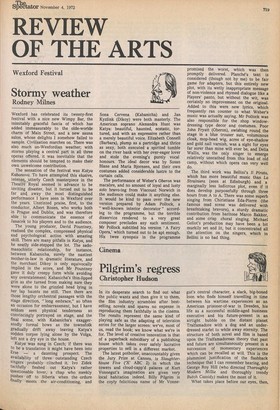Wexford Festival
Stormy weather
Rodney Milnes
Wexford has celebrated its twenty-first festival with a nice new Wimpy Bar, the inimitably graceful fascia of which has added immeasurably to the olde-worlde charm of Main Street, and a new sauna salon, whose delights I somehow failed to sample. Civilisation marches on. There was also much un-Wexfordian weather; with storms playing a central part in all three operas offered, it was inevitable that the elements should be tempted to make their own unwelcome contribution.
The sensation of the festival was Katya Kabanova. To have attempted this elusive, intens ,utterly Czech masterpiece in the Theatre' Royal seemed in advance to be inviting disaster, but it turned out to be far and, away the most distinguished performance I have seen in Wexford over the years. Unstinted praise, first, to the conductor, Albert Rosen, who works both in Prague and Dublin, and was therefore able to communicate the essence of Janacek to his players and to the audience.
The young producer, David Pountney, realised the complex, compressed physical and psychological action with amazing skill. There are many pitfalls in Katya, and he neatly side-stepped• the lot. The sadomasochistic relationship, for instance, between Kabanicha, surely the nastiest mother-in-law in dramatic literature, and the merchant Dikoy is only equivocally implied in the score, and Mr Pountney gave it duly creepy form while avoiding any overstatement; Kabanicha's thin-lipped grin as she turned from making sure they were alone to the grizzled head lying in her lap haunts me still. Then there are those lengthy orchestral passages with the stage direction, " long embrace," so Often an occasion for embarrassment, but I have seldom seen physical tenderness so convincingly portrayed on stage, and the final scene, with Kabanicha's exaggeratedly formal bows as the townsfolk gradually drift away leaving Katya's sodden corpse lying alone by the Volga, left not a dry eye in the house.
Katya was sung in Czech; if there was to be a translation it might have been into Erse — a daunting prospect. The availability of three outstanding Czech singers probably clinched it. Ivo Zidek tactfully fleshed out Katya's rather questionable lover, a chap who meekly Pushes off to Siberia when the ordure finally meets the air-conditioning, and
Sona Cervena (Kabanicha) and Jan Kyzlink (Dikoy) were both masterly. The American soprano Alexandra Hunt was Katya: beautiful, haunted, ecstatic, tortured, and with an expressive rather than a merely beautiful voice. Elizabeth Connell (Barbara), plump as a partridge and thrice as sexy, both executed a spirited tumble on the river bank with her over-eager lover and stole the evening's purely vocal honours. The ideal decor was by Susan Blane and Maria Bjornsen, and their own costumes added considerable lustre to the curtain calls.
The performance of Weber's Oberon was macabre, and no amount of loyal and lusty solo bravo-ing from Viscount Norwich in the audience could make it anything else. It would be kind to pass over the new version prepared by Adam Pollock, a "well-known interior decorator" according to the programme, but the terrible disservice rendered to a very great composer precludes any such sentiment. Mr Pollock subtitled his version 'A Fairy Opera,' which turned out to be apt enough. His twee synopsis in the programme promised the worst, which was then promptly delivered. Planche's text is considered (though not by me) to be fair game for adapters, but this entirely new plot, with its wetly inappropriate message of non-violence and rhymed dialogue like a Players' panto, but without the wit, was certainly no improvement on the original. Added to this were new lyrics, which frequently ran counter to what Weber's music was actually saying. Mr Pollock was also responsible for the shop windowdressing type decor and costumes. Poor John Fryatt (Oberon), swishing round the stage in a blue trouser suit, voluminous cloak, mop-head wig, acres of eye-shadow and gold nail varnish, was a sight for eyes far sorer than mine will ever be, and Delia Wallis, was the only singer to emerge relatively unscathed from this load of old camp, without which opera can very well do.
The third work was Bellini's II Pirata, which has more beautiful music than La Strainiera (seen at Edinburgh) and a marginally less ludicrous plot, even if it does develop purposefully through three hours from A to A. There was some superb singing from Chiristiane Eda-Pierre (the famous mad scene was delivered with breathtaking bravura), a sturdy dramatic contribution from baritone Marco Bakker, and some crisp choral singing. Michael Geliot's production may have been a bit murkily set and lit, but it concentrated all the attention on the singers, which in Bellini is no bad thing.








































 Previous page
Previous page